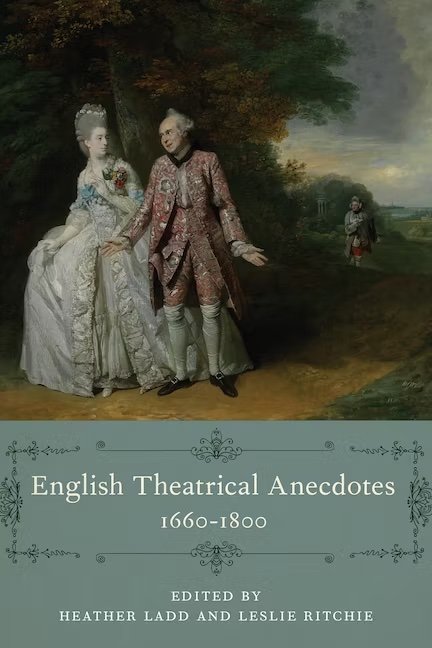Publications
If you would like to see one of these publications but don’t have institutional access to Project Muse, please email me at adelbalzo@uvu.edu and I will happily send a PDF. Jump to Book Chapters, Performance Reviews or Book Reviews.
Journal Publications
Mr. Savigny in Oroonoko, “I’ll turn my face away and do it so,” Covent Garden, 1771-1772 (published 1776)
Making Whiteness Visible: Slavery and Oriental She-Tragedy in Thomas Southerne’s Oroonoko
Eighteenth-Century Life
Vol. 48, no. 3 (2024): 7-23.
This article offers a generic argument for the white Imoinda in Thomas Southerne’s stage adaptation of Aphra Behn’s Oroonoko. Southerne’s adaptation was one of the earliest depictions of plantation slavery on the English stage, and it drew on tropes from the Oriental she-tragedy’s depiction of enslaved European women in the Ottoman Empire. Evoking Desdemona in the then-popular Othello, Imoinda offers a rare moment when the actress’s whiteness is named as such diegetically. The stage Oroonoko shines a spotlight on the way that gendered performance worked through naturalizing white women as the default sympathetic subject for Enlightenment audiences. The dramatic conventions of the Oriental she-tragedy make this representation of the white Imoinda imaginatively viable, and that the dissonance of her character reveals the contradictory nature of race thought in the long eighteenth century.
“The Archive and the Repertoire of the Treaty of Karlowitz,” for Roundtable on Daniel O’Quinn’s Engaging the Ottoman Empire
Studies in Eighteenth-Century Culture
Vol. 51 (2022): 245-48
This response argues that Daniel O’Quinn’s Engaging the Ottoman Empire uses a methodology from performance studies in order to show the centrality of oral communication to the reconfigured new world order in the wake of the 1699 Treaty of Karlowitz between the Ottomans and the Holy Roman Empire. Taking up Diana Taylor’s framework of the archive and the repertoire, the treaty negotiations are analyzed as a scenario, where the text is supplemented with the spatial and embodied vocabularies. In doing so, O’Quinn emphasizes the cosmopolitan potential in the imaginings of peace before the Western/Eastern dichotomy calcified.
Charles Macklin as Shylock in Shakespeare’s The Merchant of Venice, Covent Garden, 1767-1768
Johann Zoffany, The Holburne Museum
"The Feelings of Others": Sympathy and Anti-Semitism in Maria Edgeworth’s Harrington
Eighteenth-Century Fiction
Vol. 31, no. 4 (2019): 685-704
After receiving a letter from American Jewish reader Rachel Mordecai criticizing her previous depictions of stereotypical Jewish characters, Maria Edgeworth attempted to write a novel that would make “atonement and reparation.” What resulted is Harrington (1817), a novel that tries to explain the origins of prejudice and to discover how it can be overcome. Religious and racial tolerance for Edgeworth is a process rooted in Adam Smith’s theorization of sympathy, in understanding how an individual would feel in another person’s place. Yet the novel is not solely about the triumph of reason and compassion over the irrational passions; Edgeworth also embraces David Hume’s conception of sympathy as contagion, an articulation of communal feeling. If prejudice is pathological, then the cure can also be found in the body. However, the novel ends with the disturbing implication that, if both sympathy and negative affect are uncontrollable, complete tolerance may not actually be achievable. What remains in Harrington is not an endorsement about the power of toleration, but a dramatization of the pervasiveness of prejudice.
Review of essay in “Literature 1780–1830: The Romantic Period.” The Year's Work in English Studies
Vol. 100, no. 1 (2021)
David Garrick as Lusignan and Elizabeth Younge as Zara in Act II, Scene 3 of Zara (London, 1774). Engraved by E. Edwards after Collyer
The Sultan’s Tears in Zara, an Oriental Tragedy
SEL Studies in English Literature 1500-1900
Vol. 55, no. 3 (2015): 501-21
Oriental tragedies were among the most popular new plays of the eighteenth century and the most commonly revived. David Hume theorizes that the pleasure of tragedy comes from creating two separate presences, the character and the actor, with whom the audience could sympathize. Oriental settings paradoxically increase the potential for sympathetic exchange by highlighting the distance between the spectators and the tragic subjects. This paper focuses on Aaron Hill’s The Tragedy of Zara (1735) and argues that its metatheatrical metaphors of spectatorship increase the potential for sympathetic exchange in order to, in the words of Hill, “teach a languid people how to feel.”
Review of essay in "Recent Articles." The Scriblerian and the Kit-Cats
Vol. 50, no. 2 (2018): 148
Book Chapters
Dervish from Recueil d'Estampes sur les Costumes du Levant (1707-8)
Gérard Jean-Baptiste Scotin
Shakespeare’s Art of the Dervish: Elizabeth Montagu, Voltaire, and National Sentiment
Between East and West: Emotions in Non-Fictional Representations of the Individual, 1600-1850
Edited by Malina Stefanovska, Yinghui Wu, and Marie-Paule de Weerdt-Pilorge
New York: Palgrave Macmillan (2021), 75-91.
One of the most enduring legacies of eighteenth-century theatrical culture is the creation of the cult of Bardolatry, which made Shakespeare a representative of British national identity. Yet, in Elizabeth Montagu’s An Essay on the Writings and Genius of Shakespear (1769), Shakespeare is compared to a dervish “throwing his soul into the body of another man” in an Orientalized framing of Adam Smith’s theory of sympathy. Montagu theorizes Shakespearean tragedy as the definitive English tragic mode in opposition to classical French tragedy, embodied by the writings of Voltaire. Montagu attributes to Shakespeare a greater sympathetic capacity than the French tragedians, more interested in formal imitation than the expression of feeling. But even as Shakespeare’s sympathy makes him English, it also Orientalizes him; he has the powers described in Oriental tales of not just imagining himself in the situations of others, but of co-opting their passions. Sympathy makes Shakespeare both profoundly English and almost magically Oriental, a cosmopolitan figure who gives Britain artistic legitimacy without the need for French mediation.
Review of chapter in “XI The Eighteenth Century: Drama.” The Year's Work in English Studies (2023)
Performance Reviews
The Convent of Pleasure by Margaret Cavendish, directed by Kim Weild
Red Bull Theater (Zoom Reading), 2022
Eighteenth-Century Studies
Vol. 56, no. 1 (2022): 125-127
The Woman Hater by Frances Burney, directed by Everett Quinton
The Belle’s Stratagem by Hannah Cowley, directed by Gaye Taylor Upchurch
Red Bull Theater (Zoom Reading), 2021
Eighteenth-Century Studies
Vol. 54, no. 4 (2021): 1005-1007
Michael Grady-Hall (Jaffeir) and Jodie McNee (Belvidera) in Thomas Otway’s Venice Preserved, Royal Shakespeare Company. (Photo by Helen Maybanks)
Venice Preserved by Thomas Otway, dir. by Prasanna Puwanarajah
Royal Shakespeare Company, 2019
Eighteenth-Century Studies
Vol. 53, no. 2 (2020): 299-301
Leo Marks (Shylock) and Erika Soto (Jessica) in Sarah B. Mantell’s Everything That Never Happened, Boston Court Pasadena. (Photo by Jenny Graham)



















